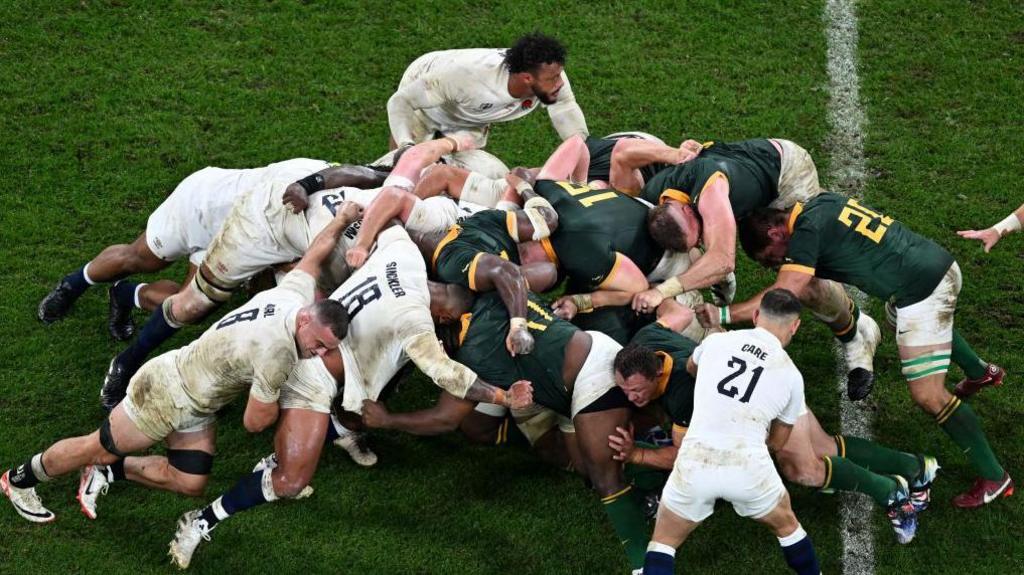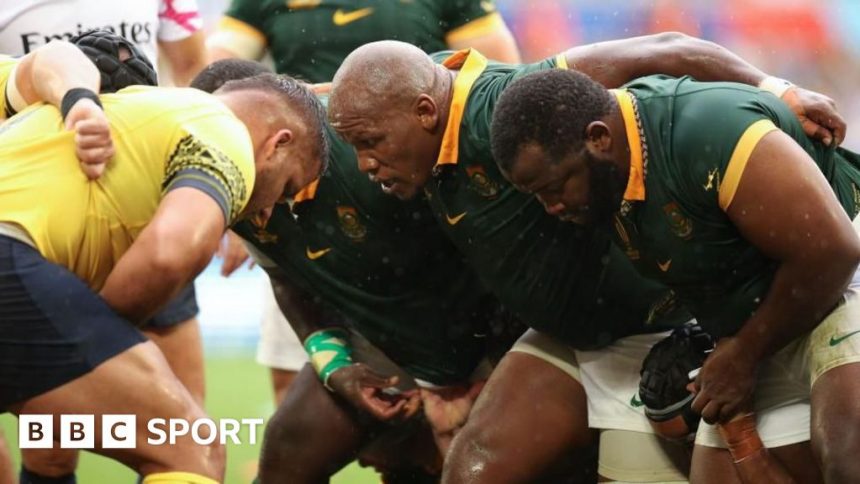‘We scrum to dominate’ – behind the eight-man Boks machine

A late scrum penalty converted by fly-half Handre Pollard handed victory to South Africa over England in last year’s Rugby World Cup semi-final
-
Published
Autumn Nations Series: England v South Africa
Venue: Allianz Stadium, Twickenham Date: Saturday, 16 November Kick-off: 17:40 GMT
Coverage: Listen to live commentary on BBC Radio 5 Live and BBC Sounds, follow live text commentary on the BBC Sport website and app.
Crouch, bind, set.
No nation personifies that process more than the world champions.
Over the past five years, the golden generation of South Africa forwards have developed arguably the most formidable and feared scrum in rugby.
The development of the now famous ‘Bomb Squad’ before the 2019 World Cup played a huge role, but their scrum runs deeper and has been part of their culture for decades.
“What South Africa do and we have always believed is that the scrum is an area where you can enforce yourself,” 2007 World Cup winner BJ Botha told BBC Sport.
“That is where we are legally allowed to be physical and manhandle players, which will hopefully overflow into other moments on the field. When we scrum, we scrum to dominate.”
Paarl Boys’ High School are one the powerhouses of schoolboy rugby in South Africa, drawing in a crowd of 25,000 last year for a match against rivals Paarl Gimnasium, and helped develop current Springboks props Thomas du Toit and Frans Malherbe.
Gurthro Steenkamp, another member of South Africa’s 2007 World Cup-winning squad, also played his schoolboy rugby there and has seen a shift towards the set-piece at an early age.
“South Africa are putting a massive emphasis on the development of props and especially the scrum,” La Rochelle scrum coach Steenkamp added.
“At my former school they start to give attention at the age of 14 and 15 to the finer techniques, so they are prepared for the ages of 15 and 16 when they have a proper contest in the scrum.”
Scrumming is one of few things that is restricted until adult rugby, with teams only allowed to push a maximum of 1.5 metres in school.
Botha worked as a forwards coach at Paarl Boys’ High School from 2021-2023 and now works with schools and teams on a consultancy basis to supply specialist coaching and analysis.
Rather than wait until they are old enough to go full bore at scrum time, props in the schoolboy system are trained beyond their years.
“It is a very fine balance that is regulated by the unions and referees who are doing it in a controlled manner, so we have these specialist positions coming through the system,” Botha added.
“South Africa are just doing that better as they want specialists coming through.”
The edge is not just at schoolboy level but also now the highest level.
The forming of the ‘Bomb Squad’
South Africa opted to bring captain Siya Kolisi off the bench in Sunday’s victory over Scotland
When Rassie Erasmus took over as South Africa coach in 2017, nothing was dominant. They had been defeated for the first time by Italy in 2016 and fell to their then equal lowest-ever world ranking of sixth.
Once England halted the Springboks maul at Twickenham in the autumn of 2018, Erasmus called for change at the set-piece after he felt his side lacked a pressure point against opposition.
Former South Africa scrum coach Matt Proudfoot recalls the 2018 Rugby Championship, and in particular a game against Argentina, as to where they found their best combinations at the scrum.
“We looked at who was the most destructive loose-head, and it was Beast [Tendai Mtawarira]. So, we built the combination around who would scrum well with him,” Proudfoot said.
“Then the Bomb Squad front row was who just had power, which was around [Malcolm] Marx, who was the most powerful and we built him with Steven [Kitshoff] as they scrummed well together.
“The starters were the most destructive and the finishers were the power, almost like taking the shine off the ball in the first 10-15 overs of a Test match.”
The research and practice were undertaken. The ‘Bomb Squad’ – which is now known as the forwards who come off the bench – regularly at the same time, to finish the game – were ready to roll at the World Cup.
The starting front row of Tendai Mtawarira, Bongi Mbonambi and Malherbe were replaced – aside from unplanned injuries – early in each second half by Malcolm Marx, Steven Kitshoff and Vincent Koch in their knockout victories over Japan, Wales and England.
With the added bulk of flanker Francois Louw and locks RG Snyman and Franco Mostert, the Springboks opted for six forwards on the bench and only two backs as an innovative way of maintaining their dominance up front for the entire 80 minutes.
‘Human has taken Springbok scrum to next level’
Since dismantling England’s scrum in the 2019 World Cup final, former Springbok Daan Human succeeded Proudfoot to head up the world champions’ scrum in 2020.
And the Springboks have evolved again – opting for a 7-1 bench spilt for last year’s World Cup final victory over New Zealand.
This came after a late match-winning Handre Pollard kick from a scrum penalty in their narrow semi-final victory over England.
In their quarter-final win over France, full-back Damian Willemse called a mark in his own 22 and signalled for a scrum, rather than bashing the ball 50 metres up the field.
The ultimate sign of confidence.
“It was the Springboks wanting to have a mental impact on the French team,” Steenkamp added.
“It was a collective buy-in to back ourselves and people might think we are crazy, but that shows the culture that has been created.”
South Africa scrum coach Human won four caps as a player for the Springboks
The 48-year-old bucket-hat lover spent eight years as a prop at Toulouse, winning two European Cups, before coaching the scrum at the Cheetahs and the Bulls.
Former hooker and 2019 World Cup-winner Schalk Brits is “extremely proud” of where South Africa’s scrum is now and puts a lot of that down to Human’s expertise.
“His knowledge of playing in France helps understand the mentality of different teams around the world,” Brits, who was coached by Human at the Bulls, told BBC Sport.
“Daan is phenomenal and has taken our scrum to the next level. He believes in the fact the pack is the heartbeat of the team and he looks after the players.
“If someone drops a ball he looks like a little kid in a candy shop as he is so excited for the next scrum.”
Hookers Brits, Mbonambi and Marx were key drivers in training to set the scrumming standards in 2019, with number eight Duane Vermeulen also playing a big role.
Since his departure, Proudfoot has noticed new leaders emerging to continually drive the scrum forward – literally.
“Once they feel a shift in momentum that is when they go. That is where the likes of Eben Etzebeth have matured, and Kwagga Smith has taken Duane Vermeulen’s role in the second half,” Proudfoot added.
“If your back row get excited about a scrum then it is good, Duane was like that. Kwagga and Jasper Wiese, you can see they want to scrum now.
“The culture is now embedded in them, every set-piece they are feeling you and looking for a crack – then the pressure will come.”
In Sunday’s victory over Scotland, Erasmus opted for a 7-1 spilt of forwards to backs on the bench.
He rolled out six replacements at once on the 45-minute mark, with the game in the balance. By full-time it was a comfortable 32-15 victory.
And the scrum had a big role to play. South Africa’s eight-man machine is not slowing down.







